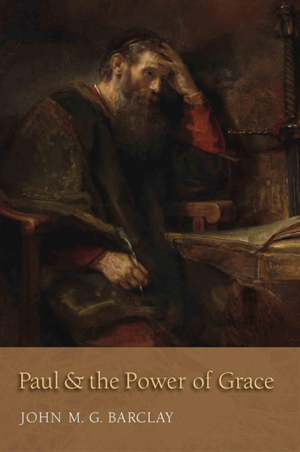The Power of Grace

In my career there have been seven paradigm-shifting (new) books in New Testament studies, books that have sent students, professors and pastors to the library to read and study and wonder and change how to think.
I can remember where I was when I read each of the following seven books.
M. Hengel, Judaism and Hellenism
E.P. Sanders, Paul and Palestinian Judaism (wow, on sale for Kindle readers)
Elisabeth Schüssler Fiorenza, In Memory of Her
Brian Blount, Then the Whisper Put on Flesh
James D.G. Dunn, The Theology of Paul the Apostle
N.T. Wright, The New Testament and the People of God.
And, John Barclay, Paul and the Gift.
Barclay’s paradigm-shifting study has now been both summarized and extended in Paul and the Power of Grace, in which he summarizes his major study with some clarifications, and then adds four new studies of a more practice-shaped nature:
- The grammar of grace and the gift of Christ
- The practice of grace
- Grace and other perspectives on Paul
- Paul and the dynamics of grace today

I cannot emphasize the value of Barclay writing this book – suddenly that massive tome, well-written as it was it was long, will be made available to pastors and to students and made “relevant” by his expansion of his original study in a life of grace.
This is now a must-have for all pastors and students.
By way of reminder, here are two major contributions of Barclay’s studies on grace – an accurate definition in context that should reshape a theology of grace, and a sorting out of the perfections and themes of grace.
Defined:
“Gift” denotes the sphere of voluntary, personal relations, characterized by goodwill in the giving of benefit or favor, and eliciting some form of reciprocal return that is both voluntary and necessary for the continuation of the relationship. In accord with the anthropology of gift, its scope includes various forms of kindness, favor, generosity, or compassion enacted in diverse services and benefits, with the expectation of some reciprocating gratitude or counter-gift. Ancient languages articulate this field of relations in a rich variety of terms, which often overlap in meaning but may also contain subtly different connotations.
The Perfections of Grace
Perfections of grace: “the tendency to draw the theme of gift/grace to an end-of-the-line extreme, especially for polemical purposes and in relation to God; and we have observed the variety of forms that this “perfecting” tendency can take” (185).
1. superabundance: the supreme scale, lavishness, or permanence of the gift;
2. singularity: the attitude of the giver as marked solely and purely by benevolence;
3. priority: the timing of the gift before the recipient’s initiative;
4. incongruity: the distribution of the gift without regard to the worth of the recipient;
5. efficacy: the impact of the gift on the nature or agency of the recipient;
6. non-circularity: the escape of the gift from an ongoing cycle of reciprocity.
Jesus Creed is a part of CT's
Blog Forum. Support the work of CT.
Subscribe and get one year free.
The views of the blogger do not necessarily reflect those of Christianity Today.


















